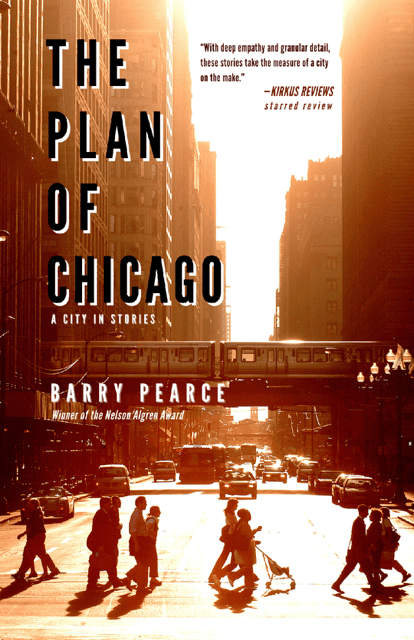Margaret never took to being called “Marge,” hating, she says, “Americans’ lazy habit of ‘nicknames.’”
Nor did she much like her U.S.-born husband’s Polish surname replacing her own.
“I no longer felt completely Polish, yet no one accused me of being an American,” Margaret says of her Chicagoan’s life in “Enumerator,” a short story by Barry Pearce. “In Gdansk, we lived with the War every day. ‘DP’ stood for ‘displaced person,’ even my generation knew. I heard the letters muttered many times in Chicago before I learned that here, it meant ‘dumb Polack.’
“MAP, JAP, DP—what kind of place shortens even such insults, as if the full label might not dehumanize enough?”
Margaret says a little later that “people heard my accent, checked a box for nanny or maid, and discounted whatever I said.”
We learn early in “Enumerator” that the circumstances of her marriage and departure from her homeland involved an estrangement from her family.
“I wrote letters home every Christmas, and my grief at the holidays deepened each year they went unanswered,” Margaret says, “The children felt it as their own. They were part of me one day, and the next, without warning, little mysteries. They stopped speaking in Polish and to muffle my accent in public, spoke over me.”
Pearce told the Echo, “My linked short story collection, ‘The Plan of Chicago: A City in Stories,’ has an unusual structure. Each piece is set in a distinct, labeled Chicago neighborhood, and characters overlap, minor players in some stories have a major presence in others.”
"Pearce gives us a Chicago true to its time and troubles but also to its dreams,” the Chicago Tribune’s reviewer said, describing his stories as “ever surprising and compelling."
The American novelist Antonya Nelson has compared them to those by masters of the genre, two Canadians, Mavis Gallant and Alice Munro, and a personal hero of Pearce’s from County Cork, William Trevor (see below).
“Like them, Pearce creates in each short story a novel’s worth of rich characterization with deft artistic compression,” she wrote. Additionally, Nelson likened his work to two “masters of geographically linked collections” — James Joyce and Sherwood Anderson.
She wrote that he “renders contemporary Chicago in loving and brutal complexity from a myriad of vivid voices. And in his own stylish manner, Pearce pulls off, again and again, dazzling plotlines that deeply satisfy. I loved reading this book.”
Another prominent writer, Alex Shakar, commented, “If only the people of a city could know how necessary they are for each other, they could heal each other and be healed in turn. Will the richly realized characters herein grasp this salvation? Either way, through Barry Pearce’s art, we may. Resonant, empathetic, and continually surprising, ‘The Plan of Chicago,’ is a glorious, living map by a master storyteller.”
Pearce said, “The characters are from Mexico, Poland, Somalia, and elsewhere. They work as housepainters, taxi drivers, sketch artists, and scam artists – often exploited by or exploiting others to make it in an unforgiving city. Chicago is at the heart of their plans, though the plan of Chicago – organized around race, class, violence, ethnicity – often forces them apart.”
He continued, “Despite the strong neighborhood setting, it is really a book about immigration. Chicago’s broad diversity – the characters are Black and White, rich and poor, straight and gay, U.S. — and foreign-born – and its place in the center of the nation make it an ideal stand-in for America, uniquely suited to revealing the country’s promise and flaws.”
Pearce, himself, grew up one of seven children born to Irish immigrant parents who’d settled on the South Side of Chicago.
He shows his commitment to both his local and his ethnic heritage in part through his enthusiasms and pastimes. “I am a docent at the Chicago Architecture Center and give architectural walking tours downtown,” Pearce said.
And he’s an Irish speaker. “Conversant, not fluent,” the writer added, saying that several years ago he started a summer conversation group, ciorcal comhrá, in Chicago.
“We meet weekly at a pub here for a pint and a chat in Irish,” Pearce said.

Barry Pearce
Birthday: June 30.
Place of birth: Chicago.
Partner: Julie Daley.
Residence: Chicago.
Published works: “The Plan of Chicago: A City in Stories”; I have also ghostwritten more than a dozen nonfiction books.
What is your writing routine? Are there ideal conditions?
I write best when I have no other pressing work and at least six uninterrupted hours – in my chair in my office with my mug. Routine is key! Bad weather helps.
What advice do you have for aspiring writers?
Always be writing! The publishing industry sucks more every day, and it will get to you if you let it. Focusing on the page insulates you from all the rejection and business noise.
Name three books that are memorable in terms of your reading pleasure.
“Tar Baby” by Toni Morrison – maybe not her greatest artistic achievement, but the one I’ve enjoyed most, it’s a brilliant postcolonial retelling of “The Tempest”;
“Island” by Alistair MacLeod – beautiful, mysterious, perfectly crafted stories from Cape Breton, set in a time when the Newfoundland island felt closer to Scotland and Ireland than to North America.
“Funny Once” by Antonya Nelson – a breathtaking book by one of the finest short story writers this country has ever produced, here at the height of her powers.
What book are you currently reading?
“Big Time” by Rus Bradburd. It’s a biting satire of college sports and academia. It couldn’t be more timely, and it’s one of the funniest things I’ve ever read.
Is there a book you wish you had written?
“Tumbledown” by Robert Boswell. Every page of this novel is dazzling, full of dizzyingly good prose, deft characterization, and brilliant imagery. I regularly feel book envy, but never to this degree or from page one.
Name a book that you were pleasantly surprised by.
“A Visit from the Goon Squad,” by Jennifer Egan. This book travels all over the map, has a big cast, leaps around in time, moves from coast to coast to continent, and yet is drum-tight, each piece meticulously crafted, wildly creative, and carefully connected to its fellows.
If you could meet one author, living or dead, who would it be?
William Trevor. There’s no Irish writer, probably few writers in English, with a greater body of work. He taught me as much as anyone about the craft of writing, though we’ve never been in the same room.
What book changed your life?
“A Portrait of the Artist as a Young Man” by James Joyce. You experience it differently at 40 than at 19, when I first read it, but at that romantic age, it made me want to be a writer.
What is your favorite spot in Ireland?
And who’s your favorite child? Not a fair question! At the risk of angering cousins in Kerry and Dublin, An Cheathrú Rua (Carraroe) in Connemara wins for its rugged beauty and ubiquitous spoken Irish.
You're Irish if...
You hear the other shoe drop before the first hits the floor.
Barry Pearce’s upcoming events include an IBAM (Irish Book Arts & Music) reading at 2:30 p.m. - 3:30 p.m. on this Sunday, Nov. 23, at the Irish American Heritage Center, 4626 N. Knox, in Chicago; and a book signing during Jim Conway’s folk jam at City Newsstand, 4018 N. Cicero Ave., on Sunday, Dec. 21 at 11 a.m. - 1 p.m. Visit his website here for details about those and other appearances.









